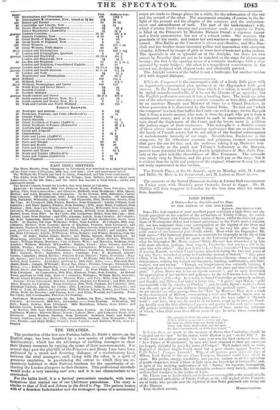LORD BYRON.
o the memory of Byron that Cambridge should be " singled out the spot" for his statue, while Harrow is yet " on the Hill"? As if this were not outrage enough), the same year sees his bust excluded from the "New Palace at Westminster," by men who have retained in their pet catalogue (so happily ridiculed by you) the name of Cowper ! With judges such as these, Raphael or Michael Angelo would stand but a poor chance against Teniers or Carlo Dolce! Con-per, forsooth ! Why, of all modern poets since the days of Milton, Lord Byron is the one whom European literature could least afford to ' spare. His genius, energy, sensibility, and passion radiant in all the splendour of poetic eloquence, throw a blaze of light upon the knowledge of Iltirriall life; and, in spite of the undying malevolence of the " Saints," his vigorous, transparent, and unaffected style, which, like his thoughts, embraces every variety, insures his undisturbed dominion in the realms of Taste. Sir, I leave you to decide which act is the most contemptible—the moral swindle of the reverend authorities of Trinity College, or the cold neglect of the Commit- tee of Goths who preside over the repletion of that florid gimcrack now rising out of the Thames. A Statue—but no Burial—and no Bust.
TO TILE EDITOR OF THE SPECTATOR.
Harrow, 2901 October 1845.
Sm—The last number of your excellent paper contained a high-flown and ela- borate panegyric on the conduct of the authorities of Trinity College, for embel- lishing their library with Thorwaldsen's statue of Byron, whilst the reverend guar- dians of Westminster Abbey had refused admittance to the Poet's mortal remains. Sir, not less indignant than your correspondent at the bigotry of the Dean and Chapter, I fearlessly assert that Trinity College is the very last place that the noble statue of our immortal poet should adorn. Hear what his biographer Mr. Galt says—" The barrenest portion as to materials for biography in the life of this interesting poet is the period lie spent at the University of Cambridge." Hear what his biographer Mr. Moore says—" While Harrow was remembered by him with more affection, perhaps, than respect, Cambridge bad not been able to in- spire him with either:' And pow listen to Lord Byron I dinself—" I was wretched at leaving Harrow, to which Iliad become attached during the two last years ot my stay there; wretched at going to Cambridge instead of Oxford." This place (Trin. Coll. Oct. 26, 18070 is wretched enough—a villanous chaos of din and drunkenness, nothing but hazard and burgundy, hunting, mathematics' and New- market, riot and racing." "Though my temperament was naturally horning, I could not share in the commonplace libertinism of the place and time withont dis- gust." "Alma Mater was to me an iniusta norerca"; and he aptly illustrated his appreciation of her intellect and politeness by the well-known tame bcar that was to sit for a fellowship. In a word, he hated Cambridge as intensely as Gray, and Dryden, and Milton, had hated it before him. "A place," says Milton, "quite incompatible with the votaries of Phcebus": and, in truth, Byron's residence there was the only spot of prosaic dullness throughout his poetical career. And now Jet me extract one other passage from his "life" by Moore—" They show a tomb in the churchyard at Harrow, commanding a view over Windsor, which was so well known to be his favourite resting-place, that the boys called it ' Byron's tomb'; und here they say, he used to sit for hours, wrapt up in thought, brood- ing lonelily over the first stirrings of passion and genius in his soul, and occasion- ally perhaps indulging in those bright forethoughts of fame, under the influence of which, when little more than fifteen years of ege, Inc wrote these remarkable lines.
• My epitaph shall be my MUM alone;
If that with honour fail to crown nay clay, Oh inny no other fame my deeds repay ! That, only that, shall single out the spot, Ily thatt remembered, or with that forgot.'" Is it not, then, an insult to the memory of Byron that Cambridge should be " singled out the spot" for his statue, while Harrow is yet " on the Hill"? As if this were not outrage enough), the same year sees his bust excluded from the "New Palace at Westminster," by men who have retained in their pet catalogue (so happily ridiculed by you) the name of Cowper ! With judges such as these, Raphael or Michael Angelo would stand but a poor chance against Teniers or Carlo Dolce! Con-per, forsooth ! Why, of all modern poets since the days of Milton, Lord Byron is the one whom European literature could least afford to ' spare. His genius, energy, sensibility, and passion radiant in all the splendour of poetic eloquence, throw a blaze of light upon the knowledge of Iltirriall life; and, in spite of the undying malevolence of the " Saints," his vigorous, transparent, and unaffected style, which, like his thoughts, embraces every variety, insures his undisturbed dominion in the realms of Taste. Sir, I leave you to decide which act is the most contemptible—the moral swindle of the reverend authorities of Trinity College, or the cold neglect of the Commit- tee of Goths who preside over the repletion of that florid gimcrack now rising out
Your obedient servant,
of the Thames.
Your obedient servant, HARROVIENS18. HARROVIENS18.


























 Previous page
Previous page